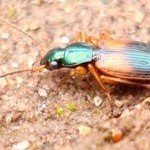New Zealand researchers are looking at two important marine species, snapper and dolphins, in the wake of ground-breaking lab-based research showing predators select prey for a nutritionally-balanced diet that will give them the best chance of producing healthy offspring.

Nutritional ecologist Professor David Raubenheimer, of Massey University — whose work with researchers at Oxford, Exeter, Sydney, and Aarhus (Denmark) universities has just been published in the Proceedings of the Royal Society B — says there are “huge implications” for ecological studies involving food webs.
The researchers had previously shown predators behaved in ways that balanced their nutrient gain, but the new work had shown that this behaviour was really important for their evolutionary fitness. “This is very fundamentally important for food chain and food web analysis,” he told the SMC.
The fact that some — and probably many — predators choose their food on the basis of its nutritional value, rather than just overall calorie content was shown in a benchtop experiment with ground beetles collected from the wild in Denmark. They were given a variety of diets, with some able to choose foods high in fat or protein, and others with no choice. Beetles that were provided with a range of foods selected the balance of protein and fat best for producing healthy eggs, and these beetles produced more eggs than the beetles that did not have the right nutritional balance.
The study dispels assumptions that predators can only focus on obtaining sufficient calories in their diets, and the researchers believe that most predators are likely to have also evolved to select food on the basis of its nutritional value, Prof Raubenheimer told the SMC. “Foraging theory today has been built on the assumption that this doesn’t happen,” he said. “The implications for behaviour are massive — because there’s a big difference between an animal that forages for whatever it can get, and an animal that forages selectively. Foraging theory hasn’t taken this into account at all”.
Impacts of predators balancing their diets partly for best reproductive success might be globally important for both conservation and pest-control work, he said.
“If predators are balancing their nutrient gain in this way, then there may different predctions about the choices of prey that they make, and if nutrient balance does matter to predators then there are also different predictions regarding-population level stuff, such as reproductive performance”. This could be crucial in circumstances where predators had a choice of prey which included both invasive and native species.
“We need to start thinking about this on two levels, in terms of the behaviour of the predators and in terms of the nutritional consequences at a population level”.
“One of the important implications is in the food web theory that underlies much of ecology: Knowing how these food chains work would be enhanced by knowing what the relationship is between the predators in the food chain and their foods”. If predators had evolved mechanisms to balance their nutrient-gain, an important next step would be to ground-proof the laboratory work to confirm that balancing of nutrient-gain in the wild was one of the drivers of foraging behaviour and ecology.
“It might be that predators out there are so limited they take what they can get, but I sincerely doubt that is the case: the fact that they have these mechanisms suggests that they have been subject to millions of years of natural selection in an environment where nutrient balancing was important”.
Prof Raubenheimer said he was now looking at NZ snapper for evidence that predators in the wild were balancing their nutrient gains: this could help ecologists evaluate habitat quality for snapper, which played a massive role in the marine ecology. “They are not only important ecologically but economically, as both a commercial quota and as a recreational fish”.
With a cetacean expert, Dr Karen Stockin from Massey University, he was also supervising a doctoral student looking at the gut contents of dead dolphins to see if they were also making prey selections for nutrient balance.